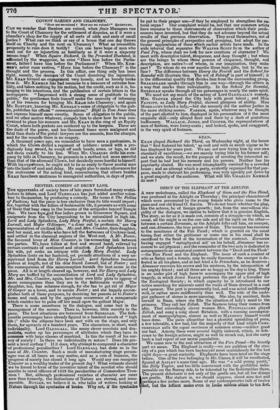GENTEEL COMEDY AT DRURY LANE.
THE upperranks of society have of late years furnished many contri- butors to letters, and Lord GLENGALL has just added another volun- teer to thenumber, by producing a comedy. He terms it The Follies qf Fashion; but the piece is less exclusive than its title would import; for, together with the follies of fashionable life, it presents us with some of those that bear sway in the bosoms of the antipodes beyond Temple Bar. We have fopsnd fine ladies grown in Grosvenor Square, and emigrants from the City languishing to be naturalized in high life. Lord and Lady Splashton, Lady Mary Fretful, a certain Sir Harry Lureall, and Major Simper, "a diner out by profession," are the representatives of civilized life. Mr. and Mrs. Counter, their daughter, and her maid, are Goths who have left the fastnesses of Cockney-land, and settled in the classical regions of the West end. A Mr. Foster, the favoured lover of Miss. Counter, is the connecting link between the parties. We,have follies at first and second hand, relieved by certain contrasts of sentiment and situation. Lord Splashton loves his wife, yet seeks an intrigue with Lady Mary Fretful. Lady Splashton doats on her husband, yet permits attentions of a very un- equivocal kind from Sir Harry Lureall. Lord Splashton becomes jealous at length, not of his dear friend Lureall, but of Foster; and the consequences of this misconception furnish the best scene in the piece. All is at length cleared up, however, and Sir Harry and Lady Mary are baffled by the reconciliation of Lord and Lady Splashton. Mr. and Mrs. Counter, again, have their own little plots to appear of more consequence than they are in the fashionable world. The daughter, too, has schemes enough, for she has to get rid of Major 0' Simper as a lover, and to secure Foster; and she happily accom- plishes both of these purposes, by deceiving her parents as to Foster's name and rank, and by the opportune occurrence of a masquerade Which enables her to palm off her maid upon the gallant Major. There is some smartness in the dialogue, and some tact in the management of the scenes. There is, however, little novelty in the piece. The best situations are borrowed from SHERIDAN. The fash- ionable personages have already figured in a hundred novels of "high life ;" while the citizens have been met with on the stage, and only there, for upwards of a hundred years. The characters, in short, want individuality. Lord GLENGALL, like many clever novelists and dra- matists, makes up his personages of attributes which they have in common with large classes of mankind. Is this the result of his sur- vey of society? Is there no individuality in nature ? Does life pre- sent a level surface ? If it does, why attempt to compound a character of professional peculiarities ? Lord GLENGALL has done so in the case of Mr. Counter. Such a mode of manufacturing stage person- ages was at all times an easy matter, and as a vein of humour, the progress of society has closed it long ago. Would any one recognize Counter as a wealthy trader of the present day ? What estimate should we be forced to form of the inventive talent of the novelist who should ascribe to naval officers of 1829 the peculiarities of Commodore Trun- nion ? But, although professional varieties of character are rarer now than formerly, the distinctions of Nature are eternal, and innu- merable. BUTLER, we believe it is, who talks of writers looking at Nature through the spectacles of books Why not, if the spectacles be put to their proper use—if they be employed to strengthen the na- tural organ? Our complaint would be, not that our common artists have recourse to those instruments of observation which their prede- cessors have invented, but that they do not advance beyond the actual results of that previous observation. They avail themselves, not of the general principles of perspective and grouping, hut adopt the par. ticular applications of these which earlier artists have made. In the wide interval that separates Sir WALTER SCOTT frcm the author of Paul Pry, where shall we look for new creations of character ? We meet with descriptive talent, eloquence, and deep thought ; but where are the beings to whom those powers of eloquence, thought, and description, are native ?—of whom, in our imagination, they make part ? To whom do we ever ascribe those high gifts, but to the au- thor? The difference between Henry the Fourth and the School for Scandal will illustrate this. The wit of Falstaff is part of himself; it is the differential quality that divides him from the surrounding group. SHAKSPEARE speaks through him in one way—through the others in a way that marks their individuality. In the School fbr Scandal, SHERIDAN speaks through all his personages in nearly the same spirit. We need not say much of the acting of Lord GLENGALL'S comedy. Mrs. GLOVER played the City lady with great talent ; and Miss FAUCITT, as Lady Mary Fretful, showed glimpses of ability. Miss MORDAUNT looked a lady,—but she scarcely did the author justice in the more striking scenes. FARREN, again, whatever may be thought of the part allotted to him, displayed in his personation of it the most exquisite skill—only alloyed here and there by a dash of gratuitous buffoonery. WALLACK, JONES, and COOPER, the representatives of men of fashion, wore livery-coats ; and looked, spoke, and swaggered, in the very spirit of footmen.


















 Previous page
Previous page